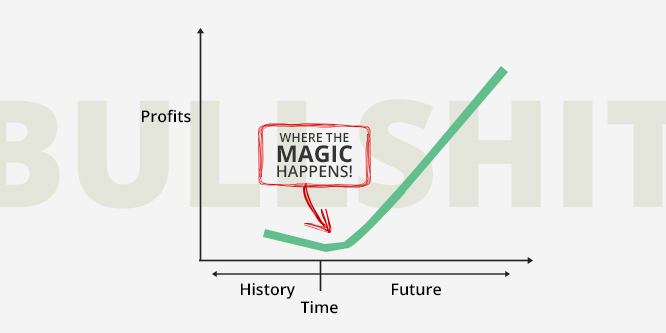Ten years ago Allan and I started working on our startup, LessAccounting. In March 2007 we launched the tiny, cumbersome SaaS product and by the end of the first 30 days we had a few paying customers…well maybe five. Every month the number of paying customers increased a bit, and this slow revenue growth felt like progress, which gave us motivation to keep working our cute asses off.

Within a year we had over a hundred paying customers, we didn’t feel like celebrating. After several more years of working our asses off we finally had enough customers we could stop taking consulting work and just focus our efforts on LessAccounting. Even in those years we never saw hockey stick growth, nothing even close.
During those years of working so many late nights we’d look at other founders talking about high growth and think “why couldn’t we get there?” We considered “maybe we’re just bad at this.” We questioned ourselves…What were we doing wrong? Did the app suck? Was it too slow? Did we not have enough features? Did we have too many? Were we just losers?
We kept trudging on, building features, refining features and doing marketing the only way we knew how.
One day we decided to ask for advice, so we got on the phone with Jason Fried of Basecamp. On the phone we gave this long story of our steady growth, our best ideas as to what works and what doesn’t, and the whys. At the end he just said “We’ve never seen hockey stick growth either, it’s always just been steady growth.”
Our minds were blown….we couldn’t believe it. Maybe it wasn’t us. Maybe this is the norm. So I started asking other founders if they’ve ever had hockey stick growth. No one we met ever saw a hockey stick of growth from a paid customer base.
I’ve come to the conclusion that hockey stick growth is a myth. Maybe it happens once a year to a b2c company that takes society by storm…maybe a snapchat or pokemon go. But it didn’t happen to us and it probably won’t happen to you. Those very few who have experienced it are outliers, and as per always, don’t compare yourself to outliers. That’s why their called “outliers,” because they lie outside an appropriate scope.
If you wanted it to build a product you’d find a way to get time to work on it. If you really wanted to start that new hobby you’d sacrifice something to find the time and money to do it.
I'll define a "Wannabe Entrepreneur" as someone who has never made money from their businesses. Here are the different types of wannabes.
In the past few years I've built go-carts, built a 200+ sq ft workshop, written several eBooks. How do I create a life where I have time to work on side projects?
Get actionable tips on making life as a business owner easier. We've been in business 8 years and we're still learning too!